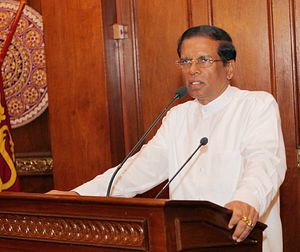While Sri Lankan President Maithripala Sirisena is in India on his first official trip abroad, Beijing wants to make sure no one thinks China is being left out. With Sirisena in India, China’s Foreign Ministry announced that Sri Lankan Foreign Minister Mangala Samaraweera will travel to China at the end of February.
As Foreign Ministry spokesperson Hua Chunying pointed out, Samaraweera will be the first cabinet minister from Sri Lanka to visit China since Sirisena’s government took office. “Both sides attach great importance to the visit,” Hua said, adding China’s “hope that the visit by Foreign Minister Samaraweera will be an opportunity for the two sides to exchange views on the development of China-Sri Lanka relations under the new circumstances.”
Those “new circumstances” – namely, the election of a new president – had some observers wondering whether Colombo would seek to distance itself from China. Under former President Mahinda Rajapaksa, the Sri Lankan government concluded a number of deals with China, including increased defense cooperation and a Chinese-funded port project in Colombo as part of the “Maritime Silk Road.” Before his election, Sirisena had promised to reconsider the wisdom of heavy reliance on Chinese support.
As events have shown, however, Sirisena’s strategy does not involve cutting ties with Beijing completely. As The Diplomat reported earlier, Sirisena’s government has promised to move forward with the Chinese-funded Colombo Port City project in order to avoid any “misunderstanding” with the Chinese government.
China, for its part, exudes confidence that it will continue to enjoy a strong relationship with Colombo no matter who is in charge “China and Sri Lanka are neighbors of long-lasting amity. The two countries have forged a strategic partnership of cooperation based on sincere mutual assistance and generations of friendship over recent years,” a Foreign Ministry spokesman said upon the news of Sirisena’s election.
In a congratulatory message to Sirisena, Chinese President Xi Jinping said, “I am willing to make concerted efforts with the Sri Lankan side to keep lifting the China-Sri Lanka strategic cooperative partnership to higher levels.” On February 4, in a message congratulating Sri Lanka upon its National Day, Xi called the China-Sri Lanka relationship “unshakeable.”
As a sign of China’s eagerness to continue working with Sirisena’s government, Assistant Foreign Minister Liu Jianchao visited Sri Lanka on February 5 (not coincidentally, the same day that Colombo announced it would allow China’s port project to go ahead). In a meeting with Foreign Minister Samaraweera, Liu defended China’s investment in Sri Lanka. Such projects “meet the international and domestic demand of Sri Lanka and can bring tangible benefits to the Sri Lankan people,” Liu said, expressing China’s hope that the projects will be allowed to continue. Liu also told Samaraweera that the “Chinese side believes that the new government of Sri Lanka will stay firmly committed to its friendly policy towards China.”
For his part, Samaraweera expressed Sri Lanka’s appreciation for the “priceless assistance” China has provided for Sri Lanka’s economic and social development. He added that the Sirisena government “welcomes China’s investment and assistance.”
Contacts with China are continuing apace under Sirisena’s administration. Sirisena is in India right now, but he will likely visit China in the near future; Samaraweera’s upcoming trip to Beijing will help lay the groundwork. With that in mind, China isn’t overly worried about Sirisena’s travels in India this week.
































